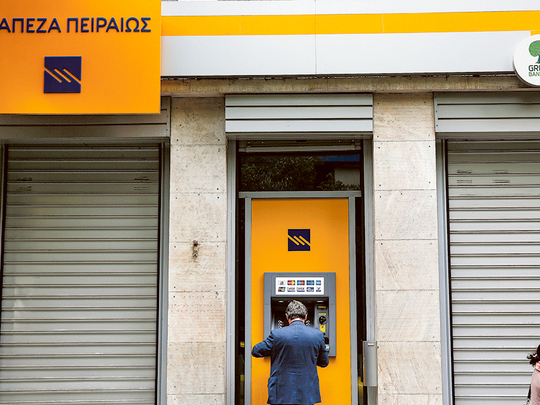
Piraeus Bank used to be a lifeline for small entrepreneurs such as Evgenia, a 33-year-old Athenian who received a loan from the neighbourhood branch to finance her start-up selling fresh flowers.
“Other banks didn’t want to know me,” she says, declining to give her surname. “Even when the crisis came and I couldn’t make interest payments, they [Piraeus] still cut me some slack.”
A reluctance to pursue distressed borrowers is one reason why Piraeus is judged to be the most precarious among Greece’s four top lenders, according to the European Central Bank’s latest health check of the sector. As Greece’s biggest bank, shoring up the finances of Piraeus, and those of its peers, will be crucial in kick-starting lending to the country’s economy, helping it to climb out of a brutal recession that has shrunk the economy by almost a quarter since 2009.
The bank’s dire straits has revived debate about the aggressive expansion strategy pursued by Michalis Sallas, Piraeus’s long-serving chairman, at the height of the Greek crisis.
While other Greek banks battened down as the crisis deepened, Sallas masterminded a series of acquisitions of collapsing lenders for nominal sums with the aim of making his own bank “too big to fail” in the event of a prolonged depression, said several Greek bankers.
A leading member of Greece’s wealthy oligarch class, Sallas kept strong ties with successive governments and also holds influence over local media advertising policy, partly through lending to cash-strapped owners and also a high-spending but selective advertising policy.
He enjoyed a close personal relationship with George Provopoulos, central bank governor during the crisis, who was previously Piraeus chief executive. “There’s no doubt that Piraeus used its political influence to acquire assets on the cheap,” said Costas Lapavitsas, an economics professor at London’s School of Oriental and African Studies and a former MP with the ruling Syriza party.
But as Piraeus and its peers — National Bank of Greece, Eurobank and Alpha — rush to meet a December 31 deadline for raising 14.4 billion euros (Dh56.68 billion) of fresh capital to shore up their balance-sheets and avert a possible bail-in of depositors, the latest ECB stress tests have laid bare the flaws in Sallas’ strategy.
Troubled loans made up as much as 57 per cent of Piraeus’s portfolio at the end of June compared with 42 per cent for Eurobank, the strongest Greek bank. Piraeus’s total capital requirements were put at 4.9 billion euros, against Eurobank’s 2.1 billion euros.
As Greece’s recession deepened, Piraeus acquired the assets of state-owned Agricultural Bank of Greece, then picked up smaller lenders including the Greek operations of France’s Societe Generale and Millennium BCP of Portugal.
In 2013, Piraeus also took over the Greek assets of Laiki and Bank of Cyprus, the two Nicosia-based banks that triggered the island’s financial collapse, with the approval of Greek politicians.
“Sallas was very helpful at a critical time for the government. If those banks had gone under in Greece, it could have sparked a disastrous bank run,” said one former cabinet member.
The Cypriot acquisitions pushed Piraeus’ share of Greek deposits and loans above 30 per cent, making it the country’s biggest lender by a wide margin. But in the eyes of many bankers, the canny Piraeus chairman had overstepped the mark.
“It may have seemed a smart move at the time but there were plenty of people around who knew the Cypriot banks’ loan book was quite poisonous,” said a London-based Greek banker.
Piraeus and its peers all passed ECB stress tests last year without any problems. But within weeks of the leftwing Syriza’s election victory in January, deposits began fleeing banks amid mounting fears that Greece would soon be forced out of the euro.
Capital controls imposed in June helped prevent a full-scale banking collapse but also pushed lossmaking businesses deeper into the red as previously restructured loans defaulted again.
Piraeus, NBG, Alpha and Eurobank have presented plans to the ECB to raise capital through a mix of equity offerings, bond swaps and the sales of foreign subsidiaries.
Piraeus launched an investor roadshow recently to raise at least 1.6 billion euros in fresh equity after arranging a 600 million euro debt-for-equity swap, thereby meeting the 2.2 billion euro capital injection required by the ECB for the bank to return to normal operations.
Anthimos Thomopoulos, Piraeus’ chief executive, said: “I am confident based on my recent contacts with investors that we will be able to source that money [1.6 billion euros] from the private market.”
Piraeus would then seek an additional 2.7 billion euros, required to meet the ECB’s scenario of what it needs to withstand another deep recession, from the Hellenic Financial Stability Fund (HFSF), a state bailout vehicle backed by the EU’s single supervisory mechanism (SSM).
The HFSF will disburse funds from a 25 billion euros bank recapitalisation basket included in the country’s latest 86 billion euros bailout.
But the freewheeling careers of bankers such as Sallas will soon be constrained by tighter regulation demanded by Greece’s creditors.
Greece’s creditors are already preparing measures to boost the governance of Greek banks with the aim of reducing political influence in the sector.
Piraeus is poised to embrace the changes, says an independent adviser to Sallas.
“The bank’s focus on small and medium businesses will stay because they are the backbone of the economy, but the board [of directors] will be different... it will include people from international institutions and senior Greek bankers with experience abroad,” the adviser said.
Haris Theoharis, former head of the finance ministry’s revenue agency, warned that supervision of the sector following the recapitalisations must be rigorous. “The SSM has to be very strict with all the Greek banks,” he said.
“It is very important that we do not succumb to ethical problems and that the clean-up is done as soon as possible.”
— Financial Times












